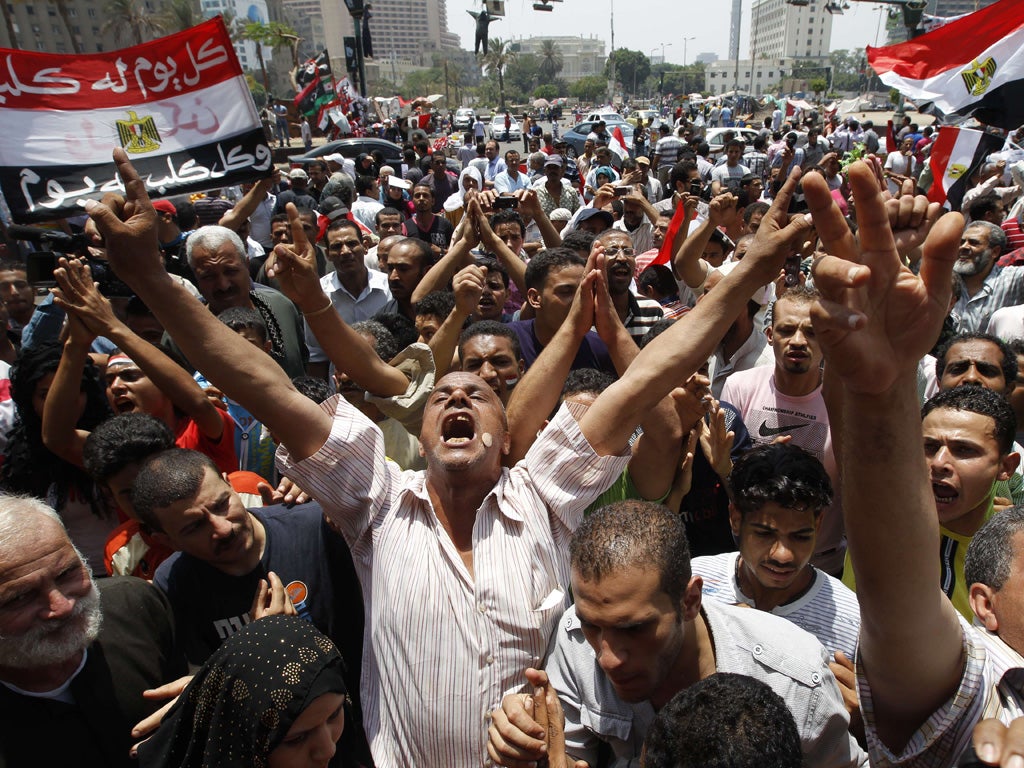Egypt in crisis as voters choose between Islamist and old regime
Calls for boycott of poll following court decision to dissolve parliament, seen as 'coup by law'

Your support helps us to tell the story
From reproductive rights to climate change to Big Tech, The Independent is on the ground when the story is developing. Whether it's investigating the financials of Elon Musk's pro-Trump PAC or producing our latest documentary, 'The A Word', which shines a light on the American women fighting for reproductive rights, we know how important it is to parse out the facts from the messaging.
At such a critical moment in US history, we need reporters on the ground. Your donation allows us to keep sending journalists to speak to both sides of the story.
The Independent is trusted by Americans across the entire political spectrum. And unlike many other quality news outlets, we choose not to lock Americans out of our reporting and analysis with paywalls. We believe quality journalism should be available to everyone, paid for by those who can afford it.
Your support makes all the difference.A deepening political crisis in Egypt threatens to overshadow a historic presidential run-off vote today, after a court decision to dissolve parliament led to warnings that the nation was heading into dangerous uncharted territory.
With voters set to choose between the Muslim Brotherhood's Mohamed Morsi and Ahmed Shafik, the former fighter pilot and Prime Minister under President Hosni Mubarak, reverberations from Thursday's ruling to disband the assembly continued to cast a pall over Egypt's transition from decades of dictatorship.
In a measure of the ill-feeling towards Egypt's ruling generals yesterday, the front page of the anti-establishment Al-Tahrir newspaper carried a giant picture of Field Marshal Hussein Tantawi with a declaration that this week's rulings were a "coup by law".
Yesterday, the Muslim Brotherhood, which controls nearly half of the seats in parliament but could lose out if elections are rerun, condemned the decision of the Supreme Constitutional Court. Apparently shocked by its sudden reversal in fortune – which might undo substantial political gains that it has struggled for nearly a century to achieve – the group released a statement saying that Egyptians were now confronted with a situation that was "even more dangerous than that in the final days of Mubarak's rule".
On Thursday, the Supreme Constitutional Court also issued a second ruling which declared that a recent law aimed at banning Mr Shafik from today's run-off was unconstitutional.
The former air force chief has won support among many Egyptians who view his strongman image as the antidote to 18 months of unrest and economic stagnation. But opponents believe he is the military's Trojan horse and will reverse the gains of the uprising.
Some Egyptians have now thrown their weight behind a campaign to boycott today's poll. They argue that the run-off represents a Hobson's choice between the Islamism of Mr Morsi and a retrenchment of the old regime.
Yesterday, activists had planned a march to Tahrir Square. But, in a sign that the Muslim Brotherhood is still banking on clawing back some of its power through the presidency, the Islamist group did not bow to pressure for its members to take to the streets.
Instead, Mr Morsi vowed to continue with the poll. "We are going to the ballot boxes to say no to the losers, the killers, the criminals," he said in a TV interview.
The Brotherhood's behaviour has inflamed old suspicions among its opponents, with some liberal and secular forces accusing the group of playing into the military's hands.
"They are still playing the game," said Sherine el-Touny, an activist and co-founder of an election-monitoring organisation. "It seems that they think maybe they still have a chance of winning the election."
The new crisis came as Amnesty International called on the government to reverse this week's ruling granting the military wide-ranging rights of arrest and investigation.
Some observers said the measures, announced by the justice ministry, were an extension of Egypt's notorious and now defunct emergency laws.
Join our commenting forum
Join thought-provoking conversations, follow other Independent readers and see their replies
Comments